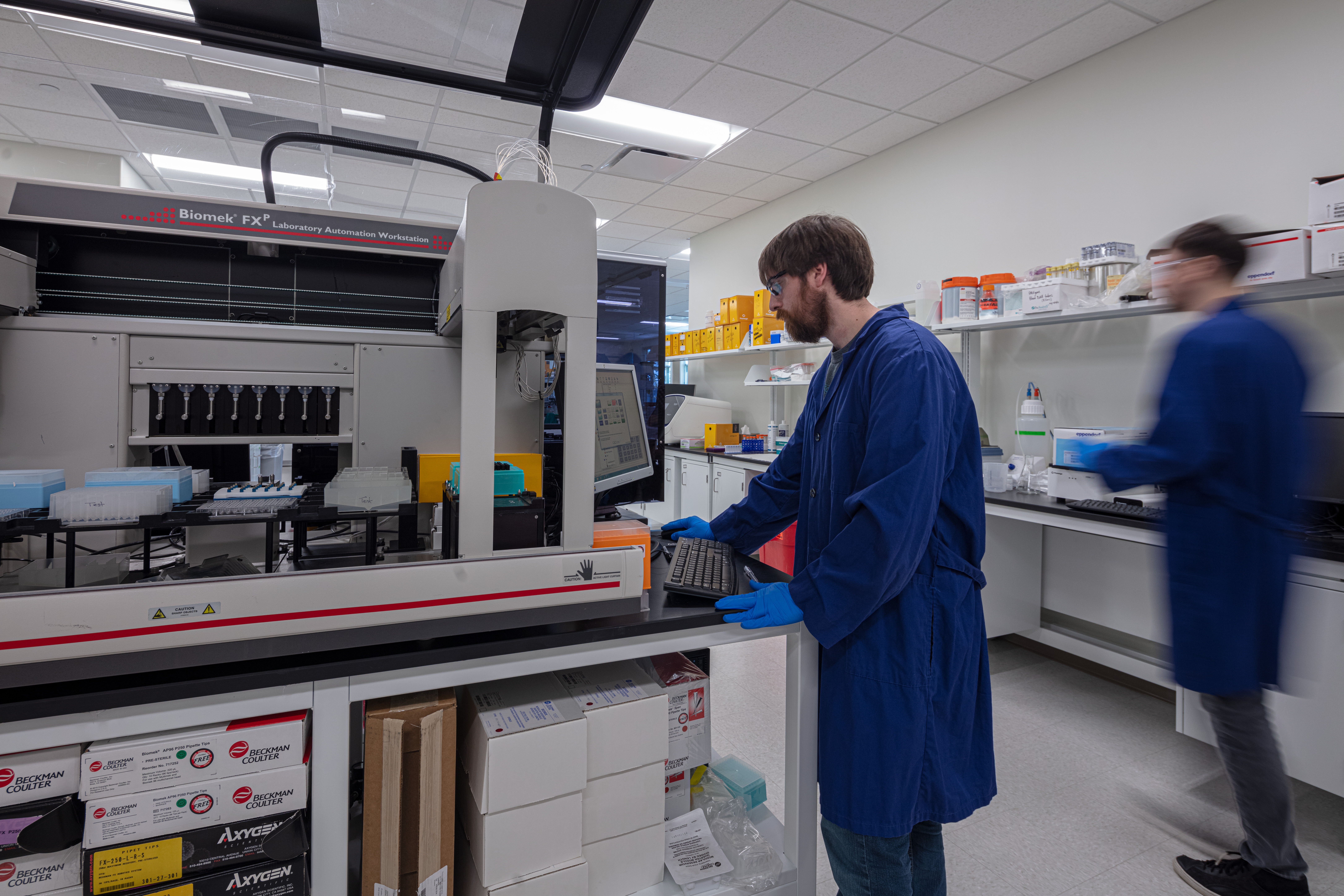
Many research labs around the world have temporarily closed their doors in response to the COVID-19 pandemic, while others are experiencing unprecedented need for reagents to perform viral testing. This urgency has led many scientists to make new connections and build creative, collaborative solutions.
“In labs that are still open for testing or other purposes, there’s certainly heightened anxiety,” says Tony Vanden Bush, Client Support Specialist. “I feel that right now, I need to help them deal with that stress however possible.”
Last week, Tony was contacted by a lab at the University of Minnesota that was preparing to serve as a secondary COVID-19 testing facility for a nearby hospital lab. The two labs needed to process up to 6,000 samples per day, and the university lab was far short of that capacity.
Tony had a contact at the University of Minnesota Genomics Center (UMGC) who had a Maxwell® demo instrument on loan from Promega. That lab would be closing in the coming days, so Tony connected the two groups to discuss collaboration. After the UMGC agreed to share their demo instrument, Tony quickly worked out an extension to the loan and offered to help with the relocation. The following day, Tony drove six hours from Iowa City to Minneapolis to pack up the instrument, drive it across campus, and install it in the Micro-Diagnostic Lab.
While Tony was delivering the demo instrument, he noticed they had an epMotion® Liquid Handler not in use. He recommended that the team set up the epMotion® instrument to do RNA extractions, which they previously had never done. Over the next few days, he provided application notes and protocols and helped the team integrate Maxwell® HT chemistries onto the instrument with support from Promega Field Support Services.
Even with the epMotion® instrument running, the lab was still a bit short of their goal. Tony finally connected the team with another University of Minnesota lab that had several KingFisher liquid handlers, which can potentially use the same chemistry to run RNA extractions. Discussions to relocate the KingFisher instruments were ongoing at the time of publication.
“For me, it’s just doing what’s necessary,” Tony says. “We’re here to help scientists get to their goals, beyond just providing chemistry.”
Logistics manager Chad Graffin shared a similar experience meeting urgent needs. Early on a Saturday morning, he was contacted by a product manager with an order. A customer in Missouri needed reagents that same day to set up a COVID-19 testing lab. An order received on Saturday would typically be delivered on Monday, but the lab couldn’t wait that long.
“They were nervous that the product wouldn’t get there same-day, but I told them not to worry,” Chad says. “Even if I had to drive it down there myself, I would do that.”
Chad manages the shipping team at Promega, so he immediately drove to the Kepler facility and started working with a team member to pack up the required products. When everything was ready, he sent a text to everyone he had talked with that morning saying that he was hitting the road.
“Even if it took the whole day, I was willing to make that drive,” Chad says. “It’s been a while since I’ve been to Missouri. But that’s not what I had to do. We set up a relay – someone in Missouri was heading north, and I was heading south, and someone from Chicago was supposed to come meet me for the middle stretch.”
Shortly after noon, Chad texted the group again to say he had reached the rendezvous point in southern Wisconsin and that he handed off the product to the next driver. The shipment arrived at its destination before the end of the day on Saturday.
Many scientists around the world are supporting each other in similar ways. Before closing their doors, several labs in Denmark contributed a Maxwell® instrument and their stock of extraction kits to a nearby testing facility. With help from Sophie Poingdestre, the Helix administrator for Promega UK, a team in the United Kingdom opened their Helix freezers to share kits with a local university hospital. In Korea, a lab awaiting shipment of viral TNA kits for work unrelated to COVID-19 testing agreed to divert a significant portion to a quarantine facility with an urgent need.
“We are committed to working with each lab in a highly consultative way,” says Sara Mann, General Manager of Promega North America. “From determining if we can help with their RNA extraction needs to connecting them with instrumentation partners, it’s important that we make ourselves available to have a conversation and listen to the needs of the community during this time.”
Promega remains committed to supporting scientists around the world during the COVID-19 pandemic. For more information about how Promega is responding to urgent needs at this time, read our blog by Chuck York, VP of Manufacturing Operations at Promega.
Promega is prepared to support scientists in their work towards understanding SARS-CoV-2 and developing drugs to treat the infection. Click here for more information.
For more information, check out our extended coverage of the COVID-19 pandemic:
- Testing for COVID-19: How it Works
- What You Need To Know About Coronaviruses [Infographic]
- How To Talk To Your Friends And Family About The COVID-19 Pandemic
Related Posts
Latest posts by Jordan Villanueva (see all)
- Tackling Undrugged Proteins with the Promega Academic Access Program - March 4, 2025
- Academic Access to Cutting-Edge Tools Fuels Macular Degeneration Discovery - December 3, 2024
- Novel Promega Enzyme Tackles Biggest Challenge in DNA Forensics - November 7, 2024
